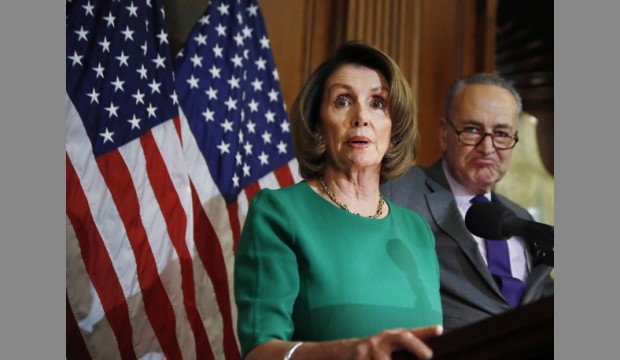Deal reached after White House defeats and incentives to Democrats
Developments on Day 101 of the Trump Administration:
Sources: Congress Agrees to Fund Government Through September
Congressional negotiators agree a $1 trillion spending package to fund the government through the end of September, according to “several congressional aides”.
Legislators are expected to vote early this week, avoiding a Government shutdown. Last Friday, after White House concessions, they agreed a one-week funding measure to prevent a closure.
The bipartisan agreement includes further incentives for Democrats, as well as $12.5 billion in new military spending and $1.5 billion more for border security requested by GOP Congressional leaders.
There is no reference to an initial $1.5 billion for Donald Trump’s 2,200-mile US-Mexican border wall, estimated to cost more than $21 billion. Instead, the new border-security money comes with strict limitations that the Trump Administration use it only for technology investments and repairs to existing fencing and infrastructure.
“This agreement is a good agreement for the American people and takes the threat of a government shutdown off the table,” said Senate Minority Leader Charles Schumer. “The bill ensures taxpayer dollars aren’t used to fund an ineffective border wall, excludes poison pill riders and increases investments in programs that the middle class relies on, like medical research, education, and infrastructure.”
Schumer and House Minority Leader Nancy Pelosi said the Republicans had withdrawn more than 160 unrelated policy measures, known as riders, including cuts to environmental funding and a scale-back of financial regulations on Wall Street.
Democrats also won the inclusion of $295 million to help Puerto Rico continue making payments to Medicaid, $100 million to combat opioid addiction, and increases in energy and science funding. Planned Parenthood will also continue to receive federal funding through September, and there is a permanent extension of a health-care program for coal miners.
“The agreement will move the needle forward on conservative priorities and will ensure that the essential functions of the federal government are maintained,” said Jennifer Hing, a spokeswoman for the GOP chairman of the House Appropriations Committee, Rodney Frelinghuysen.
The Republicans had been unsettled last week by the White House’s public insistence on a vote before Donald Trump’s 100th day in office on Saturday, with some legislators complaining of a distraction from the negotiations to avoid the shutdown.
However, on Thursday House Speaker Paul Ryan announced that there were not sufficient votes to proceed, while saying they would press ahead with the issue.
“We’re still educating members,” House Majority Leader Kevin McCarthy said. “We’ve been making great progress. As soon as we have the votes, we’ll vote on it.”
TOP PHOTO: The Democratic leaders in the House and Senate, Nancy Pelosi and Charles Schumer, speak to reporters on Friday (Manuel Balce Ceneta/AP)
Officials “Stunned” by Trump Embrace of Authoritarian Leader Duterte
Donald Trump warmly embraces Philippines President Rodrigo Duterte, causing some consternation among officials in the Executive Branch
Trump spoke with Duterte on Saturday, as part of a routine diplomatic outreach to Southeast Asian leaders. The Administration wanted to ensure those leaders did not feel excluded by a recent focus on China and Japan amid tensions with North Korea.
However, Trump drew attention to the call with his proclamation of a “very friendly conversation” and an invitation to Duterte, known for his endorsement of extrajudicial killings of drug suspects, to visit Washington.
Two “senior officials” said they expected the State Department and the National Security Council, both of which were caught off guard by the invitation, to raise objections internally.
“By essentially endorsing Duterte’s murderous war on drugs, Trump is now morally complicit in future killings,” said John Sifton, the Asia advocacy director of Human Rights Watch. “Although the traits of his personality likely make it impossible, Trump should be ashamed of himself.”
Administration officials said Mr. Trump wanted to mend the alliance with the Philippines as a bulwark against China’s expansionism in the South China Sea. White House Chief of Staff Reince Priebus added that contact was needed to pressure North Korea on its nuclear and ballistic missile programs, although experts noted that it was more important to deal with a country like Malaysia, where North Koreans hold meetings to buy or sell weapons-related technology.
Trump’s attitude may also be shaped by his commercial connection to the Philippines: his name is stamped on a $150 million, 57-floor tower in Manila, a licensing deal that earned his company millions of dollars. Mr. Duterte appointed the chairman of the company developing the tower, Jose E. B. Antonio, as an envoy to Washington for trade, investment and economic affairs.
Ivanka Trump on a billboard for Manila’s Trump Tower:

White House Threatens Critical Media With New Libel Laws
The White House threatens a clampdown on critical media with new libel laws.
White House Chief of Staff Reince Priebus — asked about yet another Donald Trump tweet about the “failing New York Times” with the conclusion “Change the libel laws?” — said on a Sunday political talk show that it is “something we’ve looked at”:
White House Chief of Staff @Reince45 tells @jonkarl: Changing the libel laws "is something that we've looked at." #ThisWeek pic.twitter.com/4ZLbDHWe8r
— Evan McMurry (@evanmcmurry) April 30, 2017
Priebus’s remarks followed a Saturday night rally at which Trump, trying to deal with the lack of achievements in his first 100 days, again focused on “fake media” and Vice President Mike Pence said journalists were the “willing allies” of left-wing activists and politicians.
Far-Right Advisor Gorka to Leave White House
Sebastian Gorka — an advisor to Donald Trump under fire for his far-right links, suspect credentials, and temperament — is leaving the White House.
A “senior White House” official said Gorka will depart in the coming days for another position within the Government.
Gorka, who labels himself a “counter-terrorism advisor”, worked for Breitbart — the outlet formerly run by White House chief strategist Steve Bannon — and Fox News before joining the White House staff.
Bannon tried to take charge of US foreign and military policy through the creation of the Strategic Initiatives Group, running parallel to the national security council, with Gorka among its members.
However, Gorka soon ran into trouble over his aggressive, attention-grabbing declarations to the media and his inability to get security clearance after being charged last year with carrying a weapon at Reagan National Airport in Washington.
Then the advisor’s past connections with far-right Hungarian group Vitezi Rend emerged, after he wore a medal awarded to his father by the organization in a televised appearance. Gorka’s unsuccessful political career in Hungary included his expression of support for a far-right militia.
In recent weeks, Gorka appeared to look for another position, including special envoy to Libya after he pressed a proposal to partition the country into three regions.
A “White House source” said Gorka’s role had diminished to the point where he was mainly appearing on TV, “giving White House tours, and peeling out in his Mustang.”
German Foreign Minister Criticizes Ivanka and Donald Trump’s “Nepotism”
German Foreign Minister Sigmar Gabriel criticises Ivanka Trump’s role as a White House advisor.
“For me there are things that remain strange, like for example the visit of his daughter to Germany which was treated almost like a world event, while the mix of politics with family and business reminds us instead of nepotism and would be unimaginable here,” Gabriel said.
Ivanka Trump’s visit to Berlin last week, participating in a women’s empowerment summit at the invitation of Chancellor Angela Merkel, prompted controversy. Trump was booed at the event as she tried to claim how much her father, accused of sexually abusive behavior amid a video in which he bragged about grabbing women, was doing for empowerment
“It always bothers me when members of a family, who have never been elected, show up suddenly as official state representatives and are treated almost as if they were members of a royal family,” Gabriel said in his interview with the German regional media group Funke.

